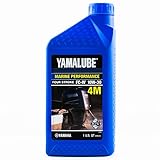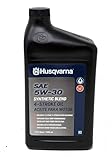The best four-stroke engine oil not only protects your vehicle’s engine but also helps your car run more smoothly.
We researched and tested dozens of options, evaluating them on performance, quality, and value. Our top choice, YamaLube All Purpose 4 Four Stroke Oil, offers maximum protection and performance.
Here is the best four-stroke engine oil.
Best Four Stroke Engine Oil: Editor Recommended
Our Editor’s Best Four Stroke Engine Oil Reviews
- Genuine OEM Factory Original Equipment Lubricant
- For use in Mercruiser Inboard & Sterndrive engines
- For use in Mercury Verado outboard motors
- Superior corrosion protection
- Most recommended OEM marine engine oil
- New look, same formula!
- LUB-10W40-AP-04
- 1 Gallon 10W-40 all purpose performance oil
- Engineered with Anti-Wear Technology that provides engine part lubrication and reduced engine wear
- All-weather synthetic blend formula promotes easier starts all year
- Antioxidants fight thermal breakdown to enhance oil durability
- Viscosity index improver helps reduce oil consumption
- Detergents help keep engine components clean and control carbon deposits
- One (1) qt./32oz. 4-stroke outboard engine oil
- Mineral based formula has a specific blend of additives for 4-stroke outboard marine engines
- Provides manufacturer recommended lubrication and bearing protection for long engine life even under high stress conditions
- Superseded From: ACC-Y4M10-30-12
- Meets or exceeds NMMA FC-W standards, meets API SJ requirements
- Prolonged engine life through improved engine cleanliness and reduced oil volatility Improved shift quality through enhanced transmission / clutch performance and dependability
- Prolonged engine life through improved engine cleanliness and reduced oil volatility
- Outstanding engine and bearing wear protection
- Official Kawasaki Product
- OUR CYCLEMAX PACK CONTAINS: Four Quarts for Honda HP4S 10W30 Full Synthetic 4 Stroke Motor Oil 08C35-SYN-1030M along with a Convenient Disposable Funnel
- QUALITY YOU CAN COUNT ON: Includes premium quality products to provide exceptional performance and protection for your Honda engine.
- COMPATIBILITY AND CONVENIENCE: After years of development, Honda’s first fully synthetic four-stroke motorcycle oil offers many advantages over conventional oil, including: Oxidation resistance, Higher film strength, Better flow at low temperatures. HP4S is approved for use in all 2006 or newer motorcycles, ATVs, Scooters and PWC. Compatible with synthetic blends like HP4 and regular petroleum oils like GN4, so there’s no need to flush the crankcases before switching to HP4S.
- Mercury 25W-40 Marine Engine Oil features high-tech, advanced anti-wear additives that provide up to 35% better camshaft wear protect
- Designed to maintain engine reliability and performance, tests have shown that Mercury 25W-40 Marine Engine Oil holds its viscosity ratings longer in industry wear-testing than other oils on the market.
- Mercury Oil, combined with a Mercury Oil Filter will offer optimum marine engine protection.
- NOTE: It is recommended that boat owners change their engine oil annually or as noted in their owners manual.
- 50% stronger wear protection to meet the extreme heat and higher RPM demands of 4-stroke marine engines
- Up to 8X better rust defense. Running or stored, your marine engine takes in moisture. Left unprotected this exposure can lead to severe rust damage
- Engineered specifically for the unique demands of marine motors
- Premium full synthetic formula for performance and durability in extreme conditions
- Semi-Synthetic 5W-30 4-Stroke Oil
- For most 2-stage 4-stroke snow blowers
- Superior cold temperature performance
- Exceeds API SJ specifications
- Made in United States
- Package height :5.588 cm
- Package length :15.748 cm
- Package width :10.921 cm
- Package weight :1.7 lbs
Best Four Stroke Engine Oil Buying Guide
1. By Application: The first step is to determine the application of the engine you are choosing from by looking at the following points:
a. Air-cooled or water-cooled: An air-cooled engine is one whose cooling system is not immersed in liquid. These are the most widely used two-stroke engines and are generally found in small-scale applications. Water-cooled engines are the ones that are immersed in liquid and heat is dissipated through the liquid.
b. Stationary or portable: The next step is to determine whether the engine you are choosing is meant for stationary or portable use. The difference lies in the mounting points of the engine.
A portable engine has mounting points that are designed to allow it to be transported easily. On the other hand, the stationary engine has no such points, which means it cannot be moved.
c. High- or low-power: The next step is to determine the intended use of the engine so that you can choose one that meets your requirements.
If it will be used for heavy-duty applications, you need to choose an engine that is more powerful. On the other hand, if it will be used in light-duty applications, you can choose a smaller engine.
d. Single- or multiple-cylinder: If you are choosing a multiple-cylinder engine, it is important to determine the number of cylinders and their configuration.
An engine can have either in-line or opposed configurations. An in-line configuration has the cylinders aligned along a single axis, while in an opposed configuration, the cylinders are arranged in a V shape.
e. Reciprocating or rotary: The next step is to determine the type of motion of the engine you are choosing. A reciprocating engine, also known as a ‘piston’ engine is the most common type of engine.
It has a crankshaft at the center with connecting rods and a connecting rod with a piston. On the other hand, a rotary engine is one where the crankshaft is fixed with the engine housing.
There are two types of rotary engines: single-phase and two-phase. In a single-phase rotary engine, there is only one single rotor, while in a two-phase rotary engine there are two rotors and they rotate in opposite directions.
What else you should know about the best four-stroke engine oil
1. What are the benefits of using a four-stroke engine oil?
Four-stroke engine oil is designed to lubricate the engine, protect it from corrosion, and help to keep it clean. It also helps to improve fuel economy and reduce emissions.
2. What are the best brands of four-stroke engine oil?
The best brands of four-stroke engine oil include Castrol, Valvoline, and Mobil 1.
3. What are the differences between four-stroke engine oils?
The main difference between four-stroke engine oils is their viscosity or thickness. Thicker oils provide more protection for engine parts, while thinner oils allow the engine to run more efficiently.
4. How do I choose the best four-stroke engine oil for my vehicle?
The best four-stroke engine oil for your vehicle is determined by the manufacturer’s specifications.
5. What are the most common problems associated with four-stroke engine oils?
The most common problems associated with four-stroke engine oils are poor lubrication, sludge build-up, and oil leaks.
Conclusion
On the market, there is numerous best four-stroke engine oil. Hopefully, the list of the top ten best four-stroke engine oil will save you time researching and deciding on the best one for you.










